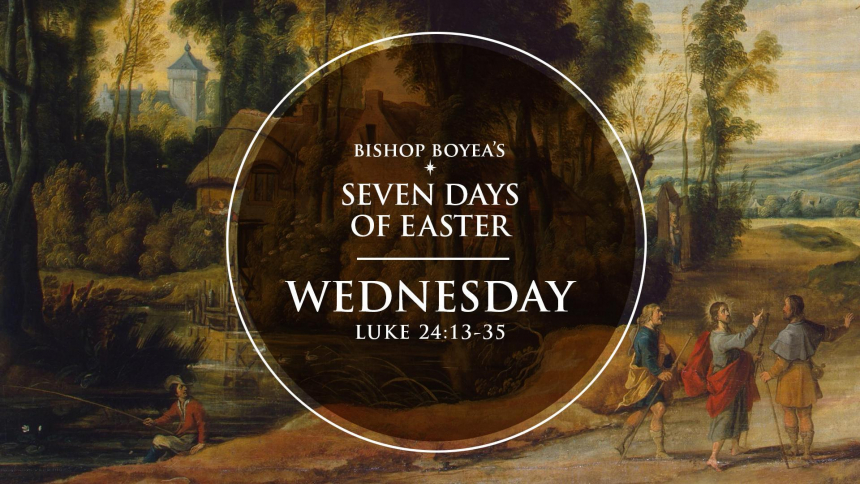
Welcome to Easter Wednesday and one of Bishop Boyea's very favorite passages of the Bible: The risen Christ's encounter with two distraught disciples on the road to the village of Emmaus (Luke 24:13-35). During this pilgrimage, Jesus "interpreted to them in all the scriptures the things concerning himself" before being recognized by the two disciples "in the breaking of bread".
"Even our day to day grind becomes a pilgrimage, a journey, in Jesus," says Bishop Boyea in his daily Easter Week reflection, April 7.
"Let us allow him to break open the story of our own lives to see God’s hand at work in us. And through the scriptures and the Eucharist may we find the very meaning of our existence in Jesus." Bishop Boyea's full text is reproduced below:
* Bishop Boyea's Seven Days of Easter | Wednesday | Luke 24:13-35
“Were not our hearts burning [within us] while he spoke to us on the way and opened the scriptures to us?” (Luke 24:32). On this Wednesday of Easter Week we hear the beautiful story of the two distraught disciples as they walk away from Jerusalem to the village of Emmaus. Not only did Jesus appear to them and not only were their eyes opened to his presence when he broke bread with them at table, but Jesus suddenly became the very key to all of the scriptures for them.
The scriptures at that time meant what we call the Old Testament. There was no New Testament as yet. And the Old Testament was in need of fulfillment. It yearned for a conclusion, an end to God’s desire to save his people and to have his people be faithful, a final satisfaction of their hunger for him. In Jesus, all is now clear. The Word of God who is Jesus reveals the full meaning of the written Word of God that has been handed on to us.
In one sense, the great marvel for the early Church was not the Resurrection from the dead, but why the Messiah had to suffer crucifixion and death in the first place. That horrible death, that cross, was a real scandal. Yet, that is precisely what Jesus tells Cleopas and his companion: “Was it not necessary that the Messiah should suffer these things and enter into his glory?” (Luke 24:26). Then Jesus interpreted the scriptures; he broke them open; he cracked the code, as it were. He did not wish to escape the human condition, but to redeem it.
We have come to understand the cross and Christ’s death as signs of Jesus’ great love for us, of the Father’s plan of salvation. We have become, in many ways, inured to the barrier which the cross can be for some. Yet, it is Jesus’ full embrace of the human condition which unites us not only with all other humans but now also with the Son of God.
Sisters and brothers, as we celebrate this week of Easter, we really must let Jesus be the key to our understanding of everything. The cross and death obtain new meaning in Jesus. Resurrection and life become new avenues in Jesus. Even our day to day grind becomes a pilgrimage, a journey, in Jesus. Let us allow him to break open the story of our own lives to see God’s hand at work in us. And through the scriptures and the Eucharist may we find the very meaning of our existence in Jesus.
